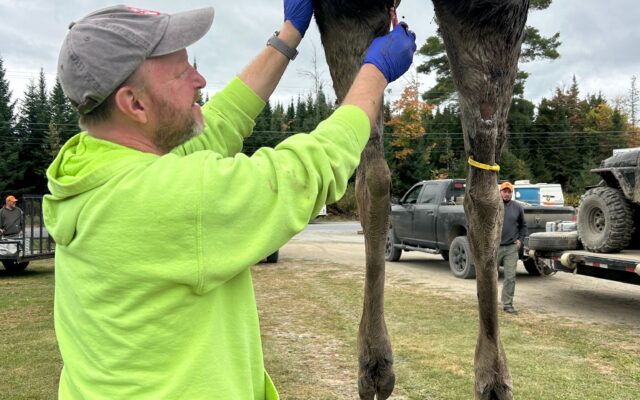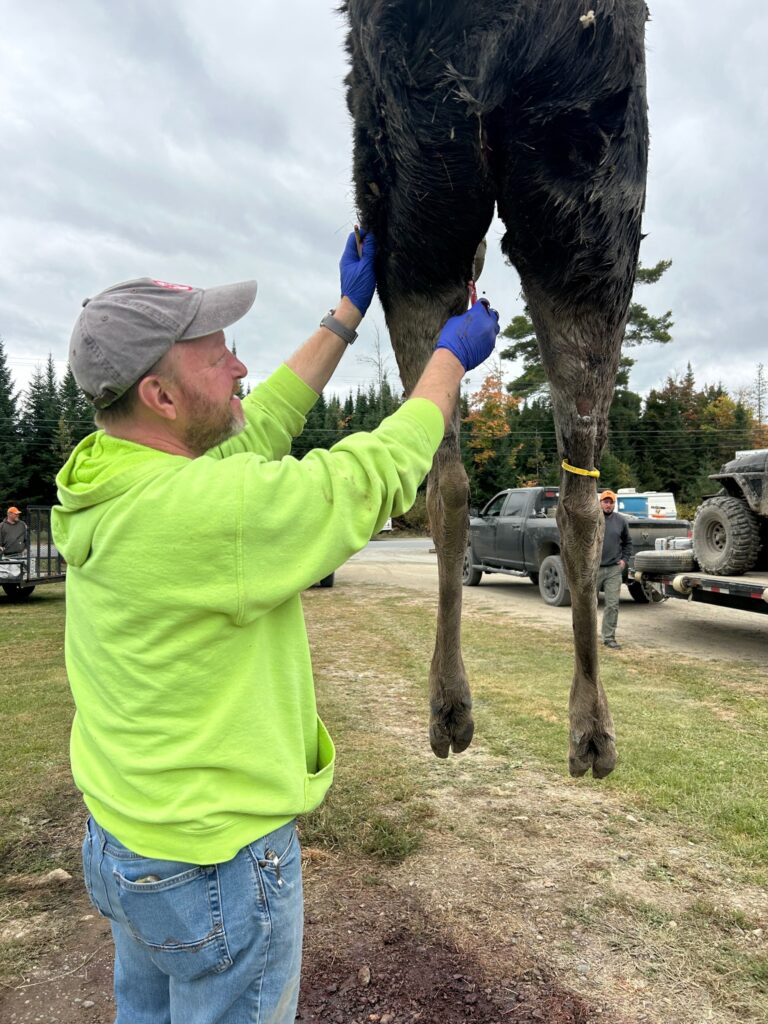
Scientists monitor insect-borne infections through moose and deer
By Julie Harris, Bangor Daily News Staff
Hunters are playing a critical role in the state’s ability to track the spread of insect-borne diseases in Maine.
The Vector-borne Disease Laboratory at MaineHealth Institute for Research in Portland sends scientists to key big game registration stations in the state to take blood and tick samples from the moose and deer brought in by hunters.
The lab has been doing this for several years now, but it has done more of it since 2010.

BLOOD AND TICK SAMPLES — Charles Lubelczyk, MPH, vector ecologist at the Vector-borne Disease Laboratory at Maine Medical Center in Scarborough, takes blood and tick samples from a moose that a hunter brought in to register at Gateway Trading Post during the first week of the 2024 moose hunt.
With the increase in dangerous viruses such as eastern equine encephalitis and West Nile across the state, it’s become imperative for those in charge of public health to know what regions hold the biggest threats for infections, which can be fatal.
“Deer and moose are considered proxies for where diseases are and what is conveying them,” said Charles Lubelczyk, vector ecologist at MaineHealth Institute for Research’s disease laboratory. “Being able to work with hunters at the hunter stations is very beneficial.”
The lab’s mosquito monitoring program started in 2000 for West Nile virus. In 2009, there was an outbreak of eastern equine encephalitis, also known as Triple E, so the lab began monitoring for that as well. In 2016, it was the Zika virus.
Now, the lab is digging deeper into the annual trends, such as there are more black-legged ticks in southern Maine and the severity of Triple E increases where there is more rain in a season. This year, although it was dry in August and September in the coastal plain and parts of Aroostook County, there was a large band of regular rain in central Maine. This also is where the increase in Triple E is this year.
In 2009, the problem month for Triple E was in August. In the last couple of years, it has extended into September, said Lubelczyk, who collected samples at Gateway Trading Post in Ashland during the first week of moose hunting.
Many of the 141 moose tagged at Gateway came from the Presque Isle and Ashland areas, he said.
In October, the lab will send scientists to Ashland, Fort Kent or Allagash, Greenville and probably Jackman, which are the moose tagging stations with the most volume of registrations, to collect blood and insects, he said. This work will continue through the deer rifle season as well.
He said there are more tick than mosquito viruses in the northern part of the state.
This year, the lab is especially looking for black legged ticks, which tend to carry the Powassan virus, and deer ticks. They are looking for areas with higher occurrences of viruses, which helps them target where to monitor next year, especially for rare and uncommon viruses such as Triple E and West Nile, he said.
They collect winter ticks off moose and black-legged ticks off deer and monitor the physiology of well-engorged insects to study their reproduction, he said. Winter ticks are just emerging and will be more prevalent in October.
The samples are sent to the Wadsworth Center in Albany, New York. Results will come in over the winter in time for planning where to allocate resources for public education and further research in the spring, he said.
The lab historically used ticks from domestic animals such as dogs, but most people use tick prevention medications on them now, he said.
Whatever the lab learns is shared with the Maine Center for Disease Control and Prevention, which uses the information to inform the public on danger areas and prevention.
Mosquitoes used to be gone by the end of September, but now temperatures in the low 50s are not uncommon and you can see the insects well into the fall and early winter, Lubelczyk said.
Lubelczyk wanted to remind hunters to take precautions this fall. He also stressed that there is no issue whatsoever with consumption of the wild game meat.
“It is turning into a mild fall and hunters should use protection for themselves and their dogs. These insects are still around,” he said.